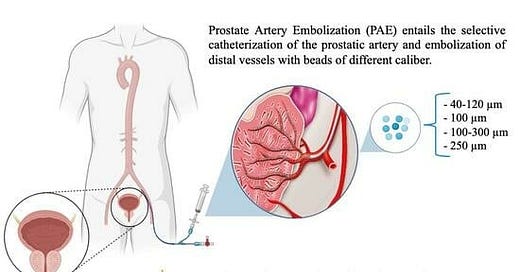Prostate Cores shares nuggets from scientific reports on prostate issues and more
Issue #1. Please subscribe.
(Welcome to Prostate Cores newsletter on the Substack platform. It’s brand-new and evolving. At this point I think it will contain mostly nuggets or abstracts of reports not covered inThe Active Surveillor with occasional in-depth coverage. I am abstracting from studies and blogs reader may not know about. I plan to cover AS but also BPH (Benign Prostatic Hyperplasia), prostatitis, and cancer survivorship. Howard Wolinsky)
By Howard Wolinsky
Here is my first batch of nuggets in the first edition of Prostate Cores:
--Lower urinary tract symptoms (LUTS) caused by benign prostatic hyperplasia (BPH) are frequently observed in older men, impacting up to 75% of men aged 50–70 years Untreated, BPH can lead to various complications, such as acute and/or chronic urinary retention, bladder dysfunction, or kidney failure. Dr. Emir Majba, of Department of Urology, Västmanland Hospital, Västerås, Sweden, and colleagues report on early experience with prostate artery embolization (PAE) in a retrospective, single-center study in the Scandinavian Journal of Urology. PAE is a minimally invasive outpatient procedure that treats an enlarged prostate by blocking blood flow to the prostate with tiny beads. A radiologist inserts a catheter into the patient's wrist or groin artery and injects tiny beads into the arteries that supply blood to the prostate. The beads block blood flow, causing the prostate to shrink over several weeks. Clinical success was achieved in 60 patients (63%) of the 96 patients. 33 (53%) achieved catheter freedom. In the non-catheterized group, 27 (79%) experienced clinical success.
(For more on PAE, go to: https://www.mdpi.com/2075-4426/14/6/613
—Pathology reports are required by law to be released immediately to patients. Unless you happen to be a pathologist by trade, you likely can’t make apex nor base of these reports. And you may be seeing this essential report even before your urologist can translate the medicalese.
There is a movement to make the language and images on the reports more accessible to the average patient. They’re called patient-centered pathology reports (PCPR).
A research letter published online Jan. 2 in the Journal of the American Medical Association. compares knowledge of diagnosis and worry among adults presented with prostate biopsy reports in a patient-centered format, which presents important clinical data in plain language, vs standard report format.
--Prostate-specific membrane antigen (PSMA) PET was approved in 2020 by the U.S. Food and Drug Administration for the staging of newly diagnosed prostate cancer. PSMA uses small amounts of radio tracers to bind to prostate cancer cells in the patient’s body. The tracers allow these cells to be seen using PET imaging. Use of PSMA PET overnight went from 0 to 70% of patients with high- or very-high-risk disease by August 2023, researchers report in The Journal of Nuclear Medicine from this study of 4,500 VA patients.
Researchers found PSMA PET positivity rates for patients were 5.9% for favorable intermediate risk, 8.2% for unfavorable intermediate risk, 14% for high risk, and 34% for very high risk.
Dr. Sean Miller and colleagues conclude: “These data confirm the utility of PSMA PET staging in high-risk disease and suggest that additional study is needed to refine patient selection in intermediate-risk disease.”
--Author Morgan Morris reports in Nature Africa about the international Men of African Descent and Carcinoma of the Prostate (MADCaP) network study using biosamples from some 7,500 participants from Ghana, Nigeria, Senegal, South Africa and Uganda. MADCaP included nearly 4,000 cases of prostate cancer.
MADCaP aimed to address gaps in research in prostate cancer in men of African descent. Morris said: “While factors like poverty and education levels have been well explored, genetic susceptibility has been under-researched among men of African descent and particularly in Africa, which has been largely overlooked. Based on findings from the United States and the Caribbean, men of African descent are disproportionately affected by prostate cancer. Scientists also want to understand an increase in prostate cases of about 60% over just the past 15 years in Southern Africa.”
Morris said: “The study identified 15 ‘private alleles’, i.e. genetic variants specific to African men. The picture is not uniform across Africa. The researchers found that the importance of these three loci and the associated genetic variants differed significantly across West Africa, East Africa and South Africa. This, they conclude, is the result of evolutionary factors.”
For more, go to Nature Genetics.




Enjoyed reading. Will consider subscribing.
Would be nice also include here some global (world) perspectives. How various illnesses are treated throughout the world, by country, by centers.
I recall conversation with a pediatrician from Holland practicing in Canada. He suggested slightly different approach (Dutch) in treating my son's ear infection. Made lots of sense.
Steven, I don't know. But I am hearing about men opting for this.
I'll keep an eye on this.
Howard